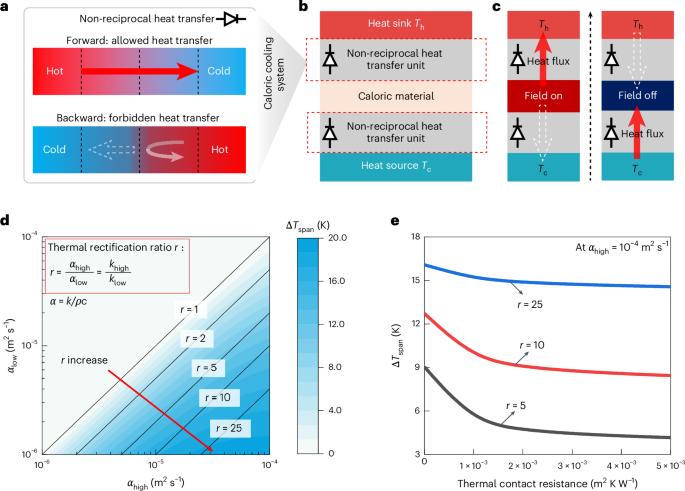可持续的全固态弹性热量冷却器,通过非互反传热实现
IF 27.1
1区 环境科学与生态学
Q1 ENVIRONMENTAL SCIENCES
引用次数: 0
摘要
非互反传热有潜力塑造高性能固态弹性热冷却技术的前景,作为传统蒸汽压缩制冷的环保替代品,具有环境问题。然而,将非互易传热与固态热冷却系统相结合的工作原理和技术路线都不明确。在这里,我们建立了一个框架,以开发非互易传热的固态弹性热器件。我们首先从理论上说明了非互易换热单元的热整流比与弹性热冷却性能密切相关。我们进一步构建了一个全固态弹性热量冷却器原型,并结合了一个超材料设计的非互反传热单元,以实现高效的传热和稳定的运行。当热整流比为6.5时,该冷却器的冷却功率为174.8 mW,对应的冷却热流密度为242.8 mW cm−2。具有非倒数传热单元的冷却器在抗屈曲压缩载荷下存活了超过200万次的设备级运行疲劳寿命而没有失效。我们的工作为下一代可持续性冷却系统的设计提供了新的空间。弹性热冷却已成为一种低温室气体排放和高能效的环保技术。这里的全固态弹性热冷却器显示了超过200万次循环的长工作寿命。本文章由计算机程序翻译,如有差异,请以英文原文为准。

Sustainable all-solid elastocaloric cooler enabled by non-reciprocal heat transfer
Non-reciprocal heat transfer has the potential to shape the landscape of high-performance solid-state elastocaloric cooling technology as an eco-friendly alternative of traditional vapour-compression refrigeration with environmental issues. However, neither the working principle nor the technical route of combining non-reciprocal heat transfer with solid-state caloric cooling system is clear. Here we establish a framework for the development of non-reciprocal heat-transfer-enabled solid-state elastocaloric devices. We first illustrate theoretically that the thermal rectification ratio of non-reciprocal heat transfer unit is strongly correlated with the elastocaloric cooling performance. We further build an all-solid-state elastocaloric cooler prototype incorporated with a meta-material designed non-reciprocal heat transfer unit for efficient heat transfer and stable operations. With a thermal rectification ratio of 6.5, the cooler exhibits cooling power of 174.8 mW corresponding to a cooling heat flux of 242.8 mW cm−2. The cooler with non-reciprocal heat transfer units survives a long device-level operational fatigue life of over 2 million cycles without failure under the buckling-resistant compressive loading. Our work suggests new space for the design of next-generation cooling systems embracing sustainability. Elastocaloric cooling has emerged as an eco-friendly technology with low greenhouse gas emissions and high energy efficiency. Here the all-solid-state elastocaloric cooler shows a long operational life of over 2 million cycles.
求助全文
通过发布文献求助,成功后即可免费获取论文全文。
去求助
来源期刊

Nature Sustainability
Energy-Renewable Energy, Sustainability and the Environment
CiteScore
41.90
自引率
1.10%
发文量
159
期刊介绍:
Nature Sustainability aims to facilitate cross-disciplinary dialogues and bring together research fields that contribute to understanding how we organize our lives in a finite world and the impacts of our actions.
Nature Sustainability will not only publish fundamental research but also significant investigations into policies and solutions for ensuring human well-being now and in the future.Its ultimate goal is to address the greatest challenges of our time.
 求助内容:
求助内容: 应助结果提醒方式:
应助结果提醒方式:


